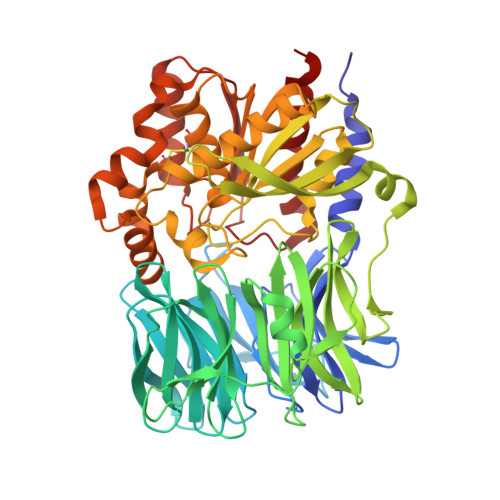Catalytically distinct states captured in a crystal lattice: the substrate-bound and scavenger states of acylaminoacyl peptidase and their implications for functionality.
Menyhard, D.K., Orgovan, Z., Szeltner, Z., Szamosi, I., Harmat, V.(2015) Acta Crystallogr D Biol Crystallogr 71: 461-472
- PubMed: 25760596
- DOI: https://doi.org/10.1107/S1399004714026819
- Primary Citation of Related Structures:
4RE5, 4RE6 - PubMed Abstract:
Acylaminoacyl peptidase (AAP) is an oligopeptidase that only cleaves short peptides or protein segments. In the case of AAP from Aeropyrum pernix (ApAAP), previous studies have led to a model in which the clamshell-like opening and closing of the enzyme provides the means of substrate-size selection. The closed form of the enzyme is catalytically active, while opening deactivates the catalytic triad. The crystallographic results presented here show that the open form of ApAAP is indeed functionally disabled. The obtained crystal structures also reveal that the closed form is penetrable to small ligands: inhibitor added to the pre-formed crystal was able to reach the active site of the rigidified protein, which is only possible through the narrow channel of the propeller domain. Molecular-dynamics simulations investigating the structure of the complexes formed with longer peptide substrates showed that their binding within the large crevice of the closed form of ApAAP leaves the enzyme structure unperturbed; however, their accessing the binding site seems more probable when assisted by opening of the enzyme. Thus, the open form of ApAAP corresponds to a scavenger of possible substrates, the actual cleavage of which only takes place if the enzyme is able to re-close.
Organizational Affiliation:
MTA-ELTE Protein Modelling Research Group, Pázmány Péter sétány 1/A, 1117 Budapest, Hungary.
















